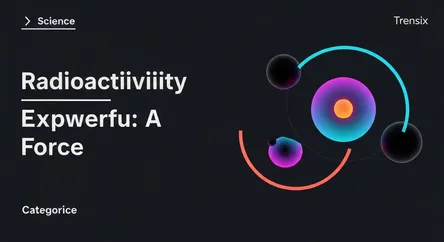Science
Radioactivity Explained: A Powerful Force

An explainer on radioactivity: the spontaneous decay of atomic nuclei, its many uses in medicine and industry, and its effects on human health.
What is it?
Radioactivity is the process by which an unstable atomic nucleus loses energy by emitting radiation. This spontaneous event, known as nuclear decay, occurs when a nucleus has an excess of energy or an imbalance of protons and neutrons. To achieve a more stable state, the atom releases energetic particles or waves, such as alpha particles, beta particles, and gamma rays. This emission transforms the atom, called a radionuclide, into a different isotope or a different element entirely. The rate of this process is measured by its half-life, the time required for half of a sample to decay.
Why is it trending?
Radioactivity is consistently relevant due to its vast and growing applications. It is fundamental to nuclear medicine for both diagnostics, like imaging organs with radioactive tracers, and for therapy, such as using high-energy radiation to destroy cancer cells. It is the basis for nuclear power plants, which generate electricity through nuclear fission. Furthermore, radioactivity is crucial in scientific research, allowing archaeologists to date ancient artifacts using carbon-14 and helping scientists study complex biological processes. Its diverse uses, from food preservation to industrial gauges, ensure its continued importance.
How does it affect people?
Radioactivity has both beneficial and harmful effects. On one hand, its applications in medicine save lives, and its role in energy production is significant. On the other hand, the ionizing radiation emitted can be hazardous to living organisms. Exposure to high doses can cause acute health effects like radiation sickness, while lower doses can damage DNA and increase the long-term risk of developing cancer. The severity of the effects depends on the dose, duration of exposure, and type of radiation. This duality makes the careful management and control of radioactive materials essential.